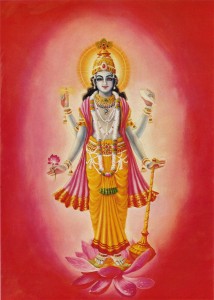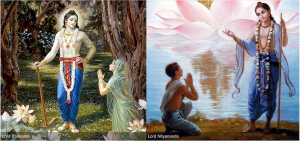Lord Brahma replied, “If a person eats once at midday on Ekadasi, the sins of his previous birth are erased, if he eats supper, the sins acquired during his previous two births are removed, and if he fasts completely, the sins accumulated during his pervious seven births are eradicated.
“O son, for anyone who bathes in a place of pilgrimage, gives charity, chants the holy names of the Supreme Lord, undergoes austerities, and performs sacrifices for Him on Haribodhini Ekadasi, the merit earned is imperishable. A devotee who worships Lord Madhava on this day with first-class paraphernalia is freed from sins of a hundred lifetimes. A person who observes this fast and worships Lord Vishnu properly is freed from great dangers.
“All holy places in the three worlds reside in the house of a person who fasts on this Ekadasi. Therefore, to please the Lord, who holds a disc in His hand, one should give up all engagements, and observe this Ekadasi fast in a mood of surrender to the Lord. One who fasts on Haribodhini Ekadasi is acknowledged as a wise man, a yogi, and an ascetic with true sense control. He knows how to enjoy this world properly and achieve liberation.
“This Ekadasi is very dear to Lord Vishnu, and thus is the very essence of religiosity. Even one observance of this great day bestows the highest reward in the three worlds.
Narada Muni inquired, “O father, please describe the relative merits of fasting completely on Ekadasi, eating supper, or eating once at midday.”
“Thus I have narrated to you the process for observing Haribodhini Ekadasi. Someone who reads or hears about this achieves the merit earned by donating cows to a qualified brahmana.”
This year Utthana Ekadasi falls on 26 Nov, 2020
“To break the fast, the devotee should first offer some prasadam to brahmanas and only then, with their permission, eat some grains.
“O Naradaji, whoever fasts on this Ekadasi will definitely not enter another womb. For that great soul who honours this Ekadasi by fasting and remaining awake throughout the night, the Supreme Lord, Sri Govinda, personally terminates the sinful reactions he may have acquired by activities of mind, body, and words.
“O son, a strict observer of Haribodhini Ekadasi achieves things very rare within the three worlds. A person whose accumulated stack of sins is high as Mount Sumeru eliminates it by fasting on Papaharini (Haribodhini) Ekadasi. The sins of a thousand previous births are burned to ashes if one fasts aas well as stays awake throughout the Ekadasi night. A mountain of cotton can be burned to ashes if one lights a small fire in it. Similarly O Narada, a person who strictly observes this fast burns away large volumes of sin. Even a small amount of pious activity on this day, performed under proper rules and regulations, earns merit huge as Mount Sumeru; however not following the rules of the Scriptures, pious activity even as great as Mount Sumeru does not earn any merit.
It is said that Lord Vishnu goes to rest for four months during the period known as Chaturmasya. Starting from Sayana Ekadasi, which is the first Ekadasi that falls in the month of Ashada rests and awaknes on the day of Kartika Shukla Ekadasi, which is why it is known as Utthana Ekadasi.
“On Haribodhini Ekadasi one should worship Sri Krishna with camphor, fruits, and aromatic flowers, especially the yellow agaru flower. One should not absorb oneself in earning money on this important day, but give profusely in charity. One should bathe the Lord with water from a conch shell. Devotional practices performed on Haribodhini Ekadasi are ten million times more beneficial than bathing in all the places of pilgrimage and giving all forms of charity.
This Ekadasi is known by three other names: Haribodhini, Prabodhini, and Devotthani Ekadasi. Falling in the shukla paksha (bright fortnight) of the sacred month of Kartika, it is the second Ekadasi of the month.
The narration of Utthana Ekadasi is found in the Skanda Purana in a conversation between Lord Brahma and his son, the great sage Narada.
Narada Muni asked his glorious father, “O universal sire, O best of all demigods, please tell me how to observe this most sacred Ekadasi?”
Lord Brahma replied, “O son, a person who wants to observe this Ekadasi should rise early on Ekadasi morning, during the brahma-muhurta hour (an hour and a half before sunrise until fifty minutes before sunrise). He should then clean his teeth and bathe in a lake, river, pond, or well, or in his own home, in accordance with the situation. After worshipping Lord Sri Keshava, he should listen carefully to the sacred descriptions of the Lord. He should offer a prayer to the Lord as follows: ‘O Lord Keshava, I shall fast on this day, which is so dear to You, and tomorrow I shall honour Your sacred prasadam. O lotus-eyed Lord, O infallible one, You are my only shelter. Kindly protect me.’ Having spoken this solemn prayer before the Lord with great love and devotion, one should fast cheerfully.
Click here to know – “How to observe ekadasi as per Srila Prabhupada’s instructions?”
“O greatest of brahmanas, Sri Narada, after thus worshipping Lord Keshava, the bestower of all material and spiritual happiness, on Haribodhini Ekadasi, one should rise early the next day, bathe in a river, chant japa of Krishna’s holy names, and render loving devotional service to the Lord at home to the best of one’s ability.

“O best of the brahmanas, the merit of observing Haribodhini Ekadasi surpasses bathing in the Ganges. This Ekadasi, which occurs during the bright fortnight of the month of Kartika, is far more purifying than an ocean or lake bath at a place of pilgrimage. This sacred Ekadasi is more powerful than one thousand Asvamedha sacrifices and one hundred Rajasuya sacrifices in nullifying sin.”
“This Ekadasi fast pleases Lord Janardana so much that He takes the person who observes it back to His abode, and while going there the devotee illuminates the ten universal directions. Fasting on this Ekadasi is a thousand times better than giving charity on the day of the solar or lunar eclipse. O Naradaji, merit earned by bathing in a place of pilgrimage, performing sacrifices, and study of the Vedas is only one ten-millionth the merit earned fasting but once on Haribodhini Ekadasi. Conversely, merit acquired by pious activities is completely fruitless if one does not observe fast and worship Lord Vishnu on Ekadasi in the month of Kartika.
Lord Brahma said to Narada Muni, “Dear son, O best of the sages, I shall narrate to you the glories of Haribodhini Ekadasi, which eradicates all sins, awards great merit, and ultimately grants liberation to the wise who surrender to the Supreme Lord.
“On Haribodhini Ekadasi, philosophical discussion of Scriptures pleases Sri Vishnu more than large charity or costly sacrifices. Chanting or hearing descriptions of Lord Vishnu’s qualities and pastimes, even if half or quarter of a verse, earns one the merit of giving a hundred cows to a brahmana. O Narada, during the month of Kartika one should give up all kinds or ordinary duties and devote one’s full time and energy especially while fasting, to discuss the transcendental pastimes of the Supreme Lord. Such glorification of Sri Hari is so dear to the Lord, that it liberates a hundred previous generations. One who spends his time enjoying such discussions, especially in the month of Kartika, achieves the result of performing ten thousand fire sacrifices.”


